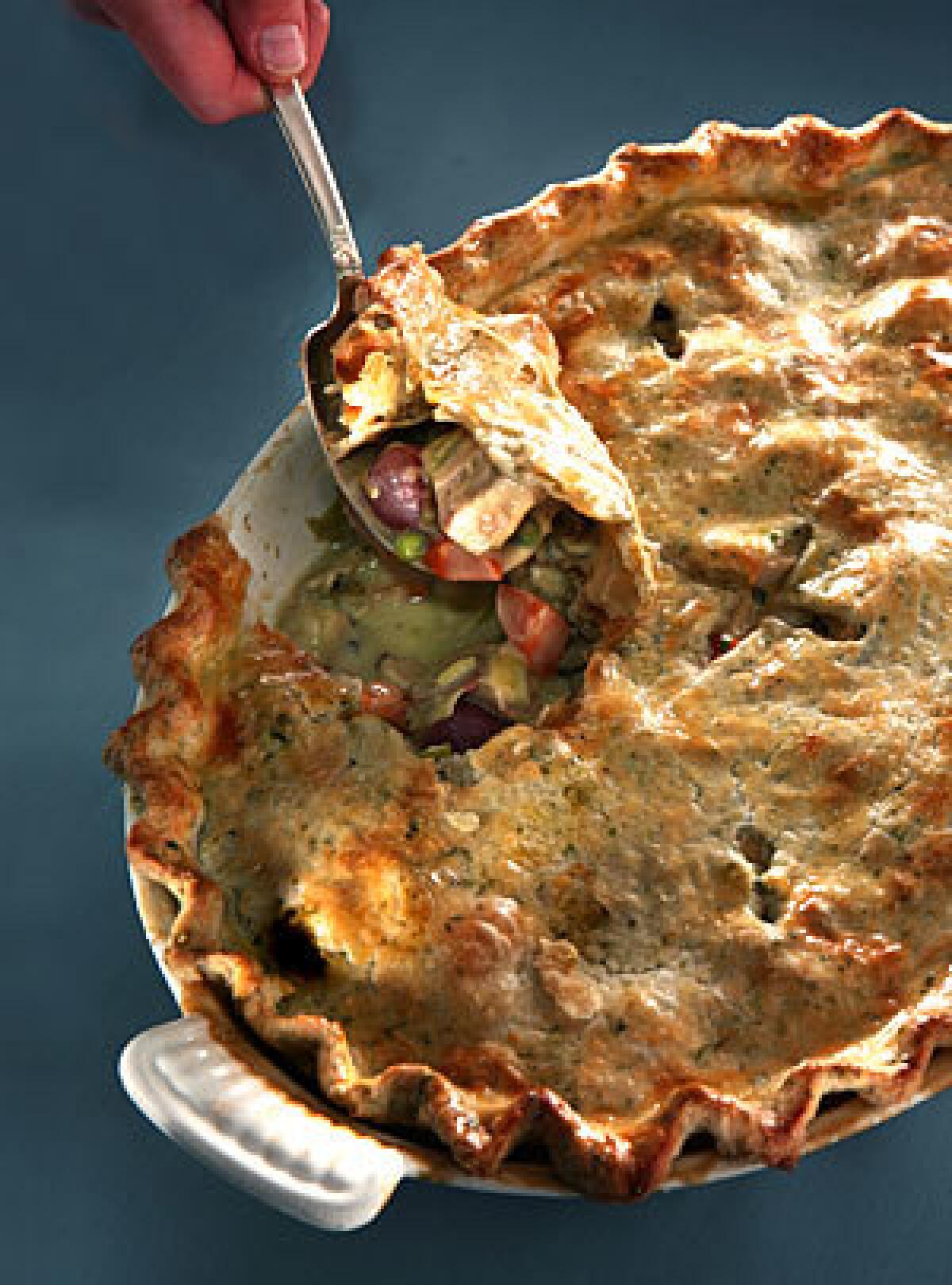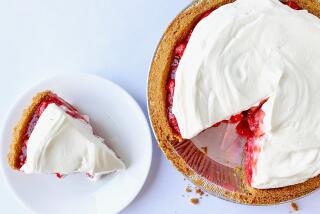Turkey pot pie, an easy second act

One of my favorite things on Earth is chicken pot pie, but one Sunday after Thanksgiving, after we’d had leftovers and there was still turkey left (due to an overly generous assessment of the size of bird needed), I thought it might be a good idea to try a turkey pot pie.
I’d made Bradley Ogden’s recipe for chicken pot pie before, with brilliant results. At the time, he was at Campton Place in San Francisco, where he was tearing up the culinary world with his renditions of classic American dishes. His breakfasts were the stuff of dreams -- fabulous corned beef hash, pancakes, bittersweet hot chocolate.
His recipe for chicken pot pie is just about perfect.I like the way he cuts the meat into 1- to 1 1/2 -inch chunks so you get a real bite of chicken, the way he poaches the vegetables in the chicken stock so the broth picks up even more flavor. Even more important, he manages to arrive at a gravy just thick enough to cloak the vegetables and poultry without being either watery or thick as wallpaper paste. His is a real pie crust too, buttery and flaky and flecked with fresh herbs.
For someone who’d grown up on Swanson’s, this was nirvana.
That pot pie -- made with turkey instead of chicken -- has become a tradition in my family. Usually, I prepare it the Sunday after Thanksgiving, spending the afternoon in a happy blur, listening to music or checking in on the game while I get it ready. I’ve already made the stock, using the turkey carcass and maybe adding some chicken parts. This year, Ralphs had turkeys on sale for 37 cents a pound, so I bought one just to make stock for pot pies and soups.
Unlike the turkey day, making pot pie after the holiday is a relaxed affair. The most labor-intensive part of it is peeling the pearl onions.
First, take the leftover turkey and cut it into chunks. You don’t need to be exact about the size or even the amount. Use as much as you have and aim for pieces about 1 to 1 1/2 inches in size.
Then take a quart of the turkey stock and use it to poach the vegetables -- the pearl onions, the mushrooms, the chunks of potato and, at the last minute, the peas. No need to be that strict about the vegetables either. I’ve been meaning to try adding some parsnips or salsify or baby turnips to the mix. You could also use baby shiitake instead of cremini, or mix chanterelles with other mushrooms.
When I made my first turkey pot pie, I thought the cream dominated the gravy, so the next time I cooked down the stock to concentrate its flavor. This worked out well, so I scribbled the details onto the ragged piece of paper that holds my pot pie notes.
Making the velouté is easy too. It shouldn’t brown like a roux but stay fairly pale. Cook the sauce just to the point it thickens enough to coat the back of a spoon.
To bake the pot pie, I use a slightly squared oval casserole from the Danish designer Piet Hein (purchased online from www.unicahome.com). The vegetables and turkey just fit. Mix them up, level them off and then pour the gravy over. The dish can be refrigerated until you’re ready to slide it into the oven.
The pie crust
Even making the crust can be relaxed. I like mine really buttery, so sometimes I add a tablespoon or so more butter than the recipe calls for. I’m not that exact about it, usually just eyeballing a chunk and cutting it off a 1-pound block.
I use a pastry blender instead of a food processor to cut the butter into the flour: I can see what I’m doing better, and all I have to wash afterward is the bowl and the pastry blender. When the dough begins to look like flakes of oatmeal, I sprinkle on a little ice water, fluffing it with a fork, until it looks like it will hold together when I press it into a ball. Wrap it in plastic wrap, flatten it into a fat disk and leave in the fridge for at least a half-hour.
An hour or so before you want to serve the pie, roll out the dough into a circle or oval shape slightly less than one-fourth-inch-thick and large enough to cover the casserole.
Roll the dough around the rolling pin to lift it, and unroll over the dish, crimping the edges of the crust. Make a few slashes to let out the steam. If you want to get fancy, glaze the top with an egg yolk mixed with a spoonful of water and decorate with pastry leaves cut from scraps of dough.
The crust will tell you when the pie has finished cooking. When it’s a deep gold and you can see the gravy bubbling at the edges (usually after half an hour or so), the pie is done.
The beautiful thing is that pot pie is so forgiving that if people are slow coming to the table, or get caught in traffic, it will wait. It seems to stay hot forever.
The other beautiful thing is that it’s such a terrific dish for wine. When choosing a wine to complement the pie’s gentle, complex flavors and buttery crust, my first instinct would be a Pinot Noir or a Gamay. But come to think of it, it also would be wonderful with a rich, oily white. This is the time to break out your best Chardonnay or a Rhone white.
I love this pot pie so much that I’ll sometimes buy a turkey breast and make one at other times of the year. It makes for easy entertaining: All you need is a salad and maybe some cheese and a simple dessert. I believe in spreading the holiday, like all good things, throughout the year.
Virbila is a Times staff writer.
More to Read
Sign up for The Wild
We’ll help you find the best places to hike, bike and run, as well as the perfect silent spots for meditation and yoga.
You may occasionally receive promotional content from the Los Angeles Times.










